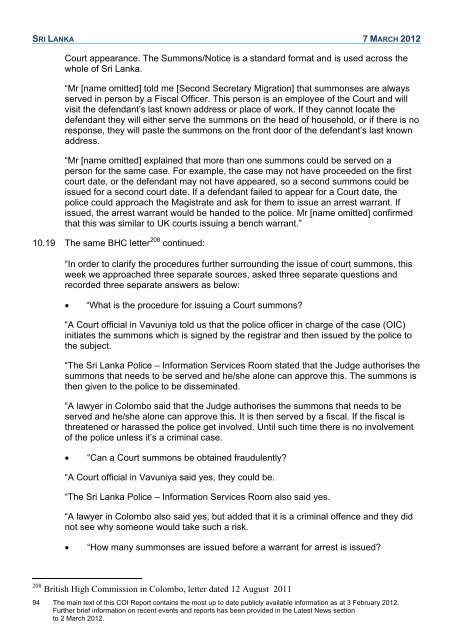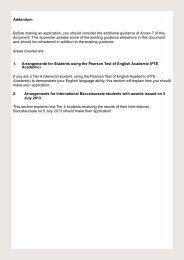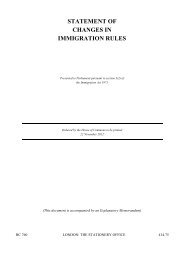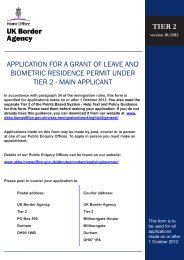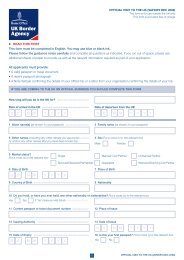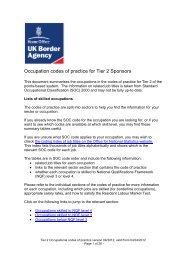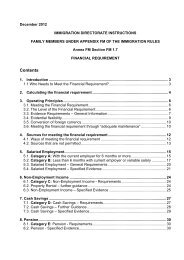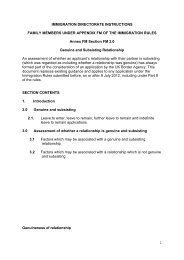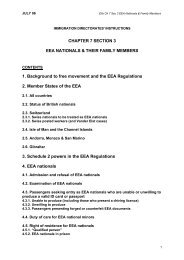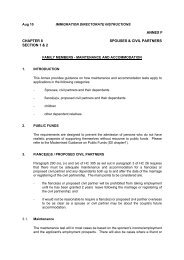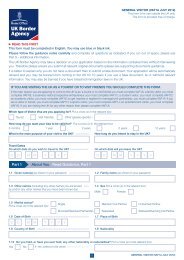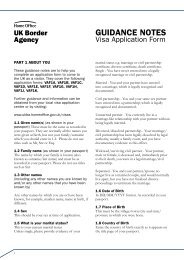COI Report March 2012 - UK Border Agency - Home Office
COI Report March 2012 - UK Border Agency - Home Office
COI Report March 2012 - UK Border Agency - Home Office
You also want an ePaper? Increase the reach of your titles
YUMPU automatically turns print PDFs into web optimized ePapers that Google loves.
SRI LANKA 7 MARCH <strong>2012</strong><br />
Court appearance. The Summons/Notice is a standard format and is used across the<br />
whole of Sri Lanka.<br />
―Mr [name omitted] told me [Second Secretary Migration] that summonses are always<br />
served in person by a Fiscal <strong>Office</strong>r. This person is an employee of the Court and will<br />
visit the defendant‘s last known address or place of work. If they cannot locate the<br />
defendant they will either serve the summons on the head of household, or if there is no<br />
response, they will paste the summons on the front door of the defendant‘s last known<br />
address.<br />
―Mr [name omitted] explained that more than one summons could be served on a<br />
person for the same case. For example, the case may not have proceeded on the first<br />
court date, or the defendant may not have appeared, so a second summons could be<br />
issued for a second court date. If a defendant failed to appear for a Court date, the<br />
police could approach the Magistrate and ask for them to issue an arrest warrant. If<br />
issued, the arrest warrant would be handed to the police. Mr [name omitted] confirmed<br />
that this was similar to <strong>UK</strong> courts issuing a bench warrant.‖<br />
10.19 The same BHC letter 208 continued:<br />
―In order to clarify the procedures further surrounding the issue of court summons, this<br />
week we approached three separate sources, asked three separate questions and<br />
recorded three separate answers as below:<br />
� ―What is the procedure for issuing a Court summons?<br />
―A Court official in Vavuniya told us that the police officer in charge of the case (OIC)<br />
initiates the summons which is signed by the registrar and then issued by the police to<br />
the subject.<br />
―The Sri Lanka Police – Information Services Room stated that the Judge authorises the<br />
summons that needs to be served and he/she alone can approve this. The summons is<br />
then given to the police to be disseminated.<br />
―A lawyer in Colombo said that the Judge authorises the summons that needs to be<br />
served and he/she alone can approve this. It is then served by a fiscal. If the fiscal is<br />
threatened or harassed the police get involved. Until such time there is no involvement<br />
of the police unless it‘s a criminal case.<br />
� ―Can a Court summons be obtained fraudulently?<br />
―A Court official in Vavuniya said yes, they could be.<br />
―The Sri Lanka Police – Information Services Room also said yes.<br />
―A lawyer in Colombo also said yes, but added that it is a criminal offence and they did<br />
not see why someone would take such a risk.<br />
� ―How many summonses are issued before a warrant for arrest is issued?<br />
208 British High Commission in Colombo, letter dated 12 August 2011<br />
94 The main text of this <strong>COI</strong> <strong>Report</strong> contains the most up to date publicly available information as at 3 February <strong>2012</strong>.<br />
Further brief information on recent events and reports has been provided in the Latest News section<br />
to 2 <strong>March</strong> <strong>2012</strong>.


